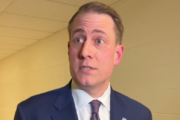Human beings favor neatness. I’m not talking about maintaining a tidy garage or a clean kitchen — although we enjoy that, too — but rather psychological neatness. Consider something like list-making. Browse the Internet, listen to a movie critic or flip on (reruns of) “The Late Show with David Letterman” and you’re bound to discover lists of 10. But why 10? How come there are always conveniently 10 exceptional movies during a calendar year? Or precisely 10 holiday gifts you simply must buy?
Well, there aren’t.
Sometimes, there are only eight must-see movies, but alas, eight is not a psychologically-satisfying number. Ten is. It’s round, whole, complete. The pitch of our voice naturally drops in finality when vocalizing the number after counting the first nine. Toddlers “know how to count” when they can make it to 10 in the proper sequence. Have you ever viewed a “Top 11” list? Or heard a 3-year-old count to nine and stop there? Did it make you feel unsettled and uneasy? Me too!
We don’t lean toward finding neatness in the 10-item list, for instance, until we’re aware of it as a societal construct. No infant emerges from the womb understanding the importance of this — we’re taught that counting to 10 is a milestone. So this, then, becomes our reality.
There are other areas in which our leanings toward neatness emerge. Take goal-setting, or the act of identifying and working toward a desired result. This, unlike our preferences for 10-item lists, is a naturally-present, firm part of the human condition. We all have aims, whatever size, and figure out ways of achieving them. The professional baseball player taking extra batting practice and the third grader striding toward the water fountain during recess are both successfully engaging in the act of goal setting — one seeking to enjoy his first 200-hit season, the other to momentarily enjoy quenched thirst.
While goal-setting is a naturally-occurring phenomenon — we always, and will always, have needs to meet and desires to fulfill — some of us choose to set our goals at intriguing times like the start of a new calendar year. That decision is often influenced by societal norms more than personal readiness.
But why Jan. 1? Where is it stated that Jan. 1 is the best day for us all to make permanent behavioral changes? What makes it better than March 4 or Oct. 18? Do you wake up on Jan. 1 feeling differently, and naturally more motivated to better yourself? Me neither!
And why do we tend to set such lofty goals for that date? For a country that suffers so epidemically with obesity, the rate at which we set health-driven goals on New Year’s Day paints us inaccurately as a wellness-conscious population. In reality, we’re convenience-conscious over wellness-conscious. Sure, our intentions are good. Gym memberships skyrocket in the month of January only to be cancelled in February or go unused throughout the year. This happens largely because it becomes too inconvenient to achieve the level of wellness we desire.
Never in my decade of working with exercisers have I come across someone who said, at the start of a new year, “I’m cutting sugar from my diet because I’m ready to make the change.” (Well, they may claim this.) But greater truth lies in the statement, “I’m cutting sugar from my diet because I’m told this is a good time to make the change.” This is a critical distinction because why someone engages in sustained exercise is meaningful.
The most powerful motivator, called intrinsic motivation, comes from within. Your motivation is intrinsic when you begin exercising for the inherent pleasure of doing so. Because the heightened energy after the workout makes you feel good; because better health means being able to spend more time outdoors with your children; because the activity itself is enjoyable. When we work out for intrinsic reasons, we gain feelings of self-control and empowerment, since our reasons are our own.
Those who are motivated extrinsically — driven to exercise by a desire to gain attention from a co-worker, receive material rewards or incentives, or because “Dad told me to” — engage in the activity as a means to an end, often to obtain something they want or to avoid realizing something they don’t desire. “I’d like to turn my health around” is an intrinsically-oriented statement. “I’d like to turn some heads” is not. Research suggests those who adopt intrinsic motivators better maintain and adhere to exercise regimens.
So it’s head-scratching when a community of people, with the utmost resolution, set their impressively high goals on Jan. 1 because external sources such as the media and the fitness industry advise them to. How convenient if our natural readiness to make health changes fell on Jan. 1, but that’s rarely the case. The New Year’s resolution is the ultimate extrinsic motivator.
And yet, studies show that people commit to their goals more fiercely after a major benchmark like New Year’s Day. Even a Monday is benchmark enough. It’s the most popular day of the week for starting diets and stopping smoking. There’s something alluring about the cleanliness (or neatness?) of the slate that Jan. 1 presents. A new year represents a new start, a new chance. And for those of us who might have failed last year, and the year before, who doesn’t like another chance?
Ultimately, the goal-setting process works best when we begin at our most ready, whatever the date may be. Consider the following simple takeaways in your own quest for wellness:
— Exercise often takes up lots of time and energy. Try to accurately identify your reason(s) for doing so.
— When you choose to begin making a change, is it because you’re ready, or because you’re feeling pressured or bored? Readiness is key.
— Start with an attainable, realistic goal. No need to impatiently expect getting into elite marathon shape by next month if you haven’t ever before run a 5K. Achieving a smaller goal will motivate you to set a higher, more challenging one. Give yourself the opportunity to feel accomplished at the start of your process.
— Appreciate the power of the benchmark. A fresh start — on a Monday, or a cherished holiday — might give you some momentum.
More from U.S. News
7 Mind-Blowing Benefits of Exercise
10 Excuses for Not Exercising, and Why They Won’t Fly
The 10 Best Exercises You Can Do for the Rest of Your Life
The Psychology of Fresh Starts originally appeared on usnews.com







